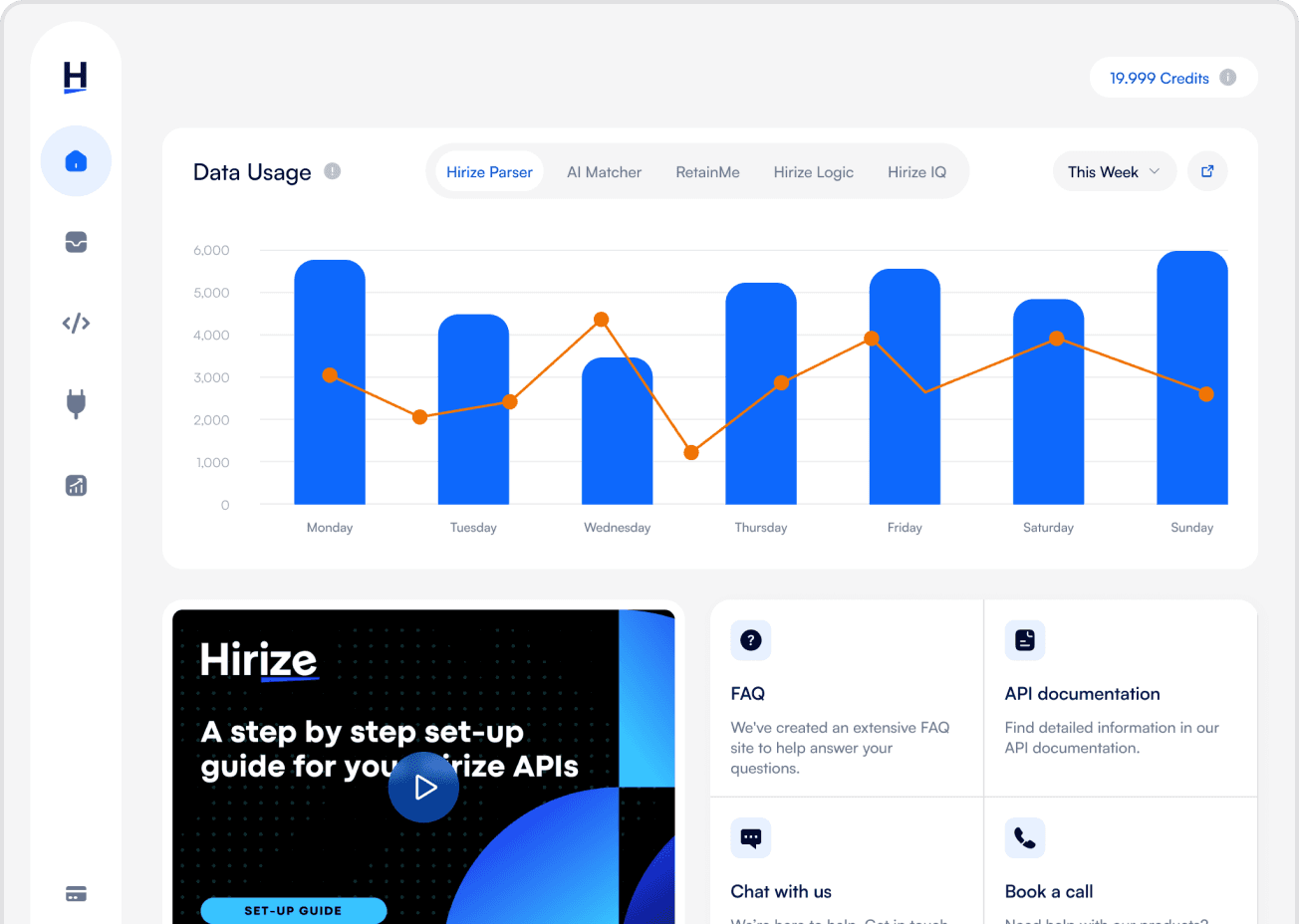superpowers?
The Game-Changing Effects of Machine Learning on Recruitment
Learn how AI recruitment and resume parsing can transform how you hire employees.

Employment practices are changing rapidly as machine learning becomes more sophisticated every day. With the help of high-quality machine learning algorithms, businesses can automate the recruitment process, and parse resumes with incredible accuracy. This is having a significant impact on the way companies hire employees. In this blog post, we will explore the game-changing effects of machine learning on employment practices. Stay tuned for more!

What is Machine Learning?
 Machine learning is a subfield of AI in which computers automatically learn to analyze and derive conclusions from large datasets. Data mining, RPA, and NLP are machine learning applications that may be implemented without coding. AI and ML are automating many time-consuming processes that formerly needed human labor, creating efficiency in the workplace across different industries. The technology has several uses in the hiring process.
Machine learning is an artificial intelligence system that uses algorithms to identify patterns and learn from data. It can be used in various ways, such as optimizing search results, predicting customer behavior, and analyzing images. In the world of recruitment, machine learning algorithms are being used to parse resumes and efficiently match candidates to job openings.
Machine learning is a subfield of AI in which computers automatically learn to analyze and derive conclusions from large datasets. Data mining, RPA, and NLP are machine learning applications that may be implemented without coding. AI and ML are automating many time-consuming processes that formerly needed human labor, creating efficiency in the workplace across different industries. The technology has several uses in the hiring process.
Machine learning is an artificial intelligence system that uses algorithms to identify patterns and learn from data. It can be used in various ways, such as optimizing search results, predicting customer behavior, and analyzing images. In the world of recruitment, machine learning algorithms are being used to parse resumes and efficiently match candidates to job openings.
How are Human Resources professionals now utilizing machine learning to attract the best candidates?
Recruiting teams have access to a treasure of information on potential candidates, but it isn't easy to gather, compile, and analyze this data to make educated hiring decisions. Machine learning is an innovation that allows recruiting professionals to free up time to focus on more strategic, value-adding endeavors. Examples of how machine learning is being used in the current talent acquisition process include background checks, passive prospects, and modifying job postings to appeal to specific skill sets. A resume parser is a tool that uses machine learning to extract data from resumes automatically. This eliminates manual resume reviews and allows recruiters to screen candidates quickly. AI recruitment solutions can also be used to efficiently track and follow up with those interested in job openings and evaluate if a candidate's resume is fit for a specific role. These features help human resources professionals make informed decisions when considering potential employees.
1. Job advertising
Machine learning can review, create, and distribute job postings and suggest changes. It can also be used to locate eligible people, who can be marketed to through online mediums such as social media and job boards. AI recruitment solutions can be used to modify job postings to attract better candidates. By analyzing data from resume parsers, AI-based systems can provide targeted job advertising tailored to potential candidates' skills and experience. This helps companies target specialized talent and reduce time spent on recruiting efforts.
2. Resume screening
Resume screening is a critical step in the recruitment process. It is time-consuming and can lead to wasted resources if done improperly. AI resume parsers use machine learning algorithms to quickly analyze resumes and identify relevant information, such as skills and certifications. They can then generate a score that ranks candidates according to their suitability for the job opening. Automated CV screening software can quickly identify those with the proper skills and experience for an open position. It takes too much time and yields too few results to manually examine resumes, making it unlikely that resumes will be reviewed equally. By using resume parsers and AI recruiting solutions, recruiters can quickly narrow the applicant pool to those who best fit the job. Machine learning in recruitment has helped streamline the process and improve hiring decisions. It assists HR teams to efficiently match candidates with roles while freeing up resources for more strategic endeavors such as employer branding and improving employee engagement. With resume parsers, AI recruitment solutions, and automated job advertising software, companies can recruit the best talent quickly and efficiently.
3. Candidate assessment
AI recruitment solutions can also assess candidates' resumes and determine their suitability for a particular role. Resume parsing algorithms extract relevant data from resumes and then use machine learning to score the CV/resume based on its relevance to the job opening. This helps recruiters quickly evaluate candidates and make better hiring decisions. AI recruiting solutions can also provide feedback on a resume's strengths and weaknesses, helping recruiters determine which areas of the CV/resume require improvement. This feedback can help candidates tailor their resumes for a specific role, making it more likely that they will be hired.
4. Candidate engagement
AI recruiting solutions can be used to track, manage, and engage with candidates throughout the recruitment process. By leveraging resume parsing algorithms and machine learning, these systems can quickly identify the best prospects and prioritize them based on their suitability for a particular role. They can then be used to set up automated messages that will alert candidates of any changes or updates to their job applications. AI recruiting solutions can also track a candidate's progress throughout the recruitment process. For example, they can monitor how long a resume has been in the system, how often it has been viewed, and which recruiters have reviewed it. This allows recruiters to keep tabs on top candidates and quickly reach out to them when a role becomes available. AI recruiting solutions are becoming increasingly important as the recruitment process continues to evolve more complex and competitive. By utilizing resume parsers, machine learning algorithms, and automated software, companies can improve hiring decisions while reducing time spent on recruiting efforts. This helps ensure that the best candidates can be hired quickly and efficiently.
5. Employee retention
AI recruiting solutions can also have a positive impact on employee retention. Leveraging resume parsing algorithms and machine learning, these systems help companies select the right candidate for a job opening. This helps decrease turnover rates by ensuring that the right candidate is hired for a role. In addition, AI recruitment solutions can also help companies understand their employees better. By providing insights into employee engagement and productivity, these systems can help employers identify areas where they may need to improve or increase resources. This helps create a more positive work environment and improves employee retention rates. The Hirize Matching API and RetainME are two examples of AI recruitment solutions that help companies maximize their hiring process. The Hirize Matching API utilizes resume parsing algorithms to assess resumes and match candidates with job openings quickly. This allows recruiters to evaluate candidates swiftly, reducing time spent on screening. RetainME is a machine learning platform that helps companies understand their workforce. The system gathers employee data and provides insights into how they perform, how satisfied they are, and what areas of improvement should be addressed. By leveraging this data, companies can create a better working environment for their employees and increase overall retention rates.
What are the pros and cons of using machine learning and artificial intelligence in the hiring process?
Pros of ML in Recruitment
AI has much to offer regarding the employment process, such as efficient searching for potential employees, successful recruitment, efficiency in recruiting, and diversity and acceptance. Machine learning has the potential to speed up the recruiting process, reduce unconscious bias, and ensure everyone has a fair shot of being selected.
1. efficiency in recruiting
Using machine learning in recruitment helps reduce the time spent on recruiting, allowing recruiters to review more candidates in less time. AI resume parsers quickly scan and evaluate resumes, making it easier for recruiters to quickly identify top talent.
2. Diversity & Acceptance
AI-based resume analysis can help reduce unconscious bias in the hiring process. By leveraging resume parsing algorithms and machine learning, these systems can identify the most qualified candidates without regard to personal characteristics such as race, gender, or ethnicity. This helps create a more diverse and inclusive workforce.
3. Unconscious Bias
Machine learning can also help reduce unconscious bias in the hiring process. Using resume parsing algorithms and machine learning, these systems can analyze resumes objectively and make unbiased decisions on whom to interview or hire. This helps create a fairer hiring process for all candidates.
4. Recruitment efficiency
AI-based resume parsers and machine learning can help recruiters quickly identify top talent. Using resume parsing algorithms; these systems can quickly scan through hundreds of resumes to find the most qualified candidate for a role. This helps reduce time spent on recruiting and allows recruiters to focus on interviewing potential candidates.
Cons of ML in Recruitment
Though AI has the potential to revolutionize the recruitment process, it is not without its risks. Using machine learning in recruitment can lead to a lack of human oversight and potential privacy issues.
1. Technology implementation and adoption
AI resume parsing and machine learning can help reduce recruitment time, but the technology can be challenging. Companies must invest in the necessary infrastructure and software for successful implementation. This requires both financial resources and technical expertise.
2. Machine Learning errors
Though AI resume parsers can be accurate, they still make mistakes. These errors can lead to a false positive or negative result, resulting in an incorrect assessment of a candidate's resume. This could lead to hiring the wrong candidates or overlooking great talent. On the other hand, Hirize is an AI-driven resume parsing platform designed to make the recruitment process easier and more efficient for companies. Utilizing machine learning, Hirize quickly scans and evaluates resumes, identifying the most qualified candidates in seconds. This helps reduce the time spent on recruitment, allowing recruiters to focus on interviewing potential candidates. Additionally, Hirize is extremely accurate, with a 98% accuracy rate. This helps ensure that the best talent is selected for a role and that recruiters can make more informed decisions when selecting candidates.
3. Candidate drop-off
AI technologies can lead to time-saving improvements and improved applicant experience, but finding a balance between AI technologies and human engagement is essential. Candidates may get disinterested or dissatisfied if they can only communicate with a chatbot.
4. Unconscious bias
Though AI resume parsing and machine learning can help reduce unconscious bias in the hiring process, there is still a risk of introducing bias into the system. Companies must be aware of potential biases leading to wrong decisions when selecting candidates.
superpowers?



